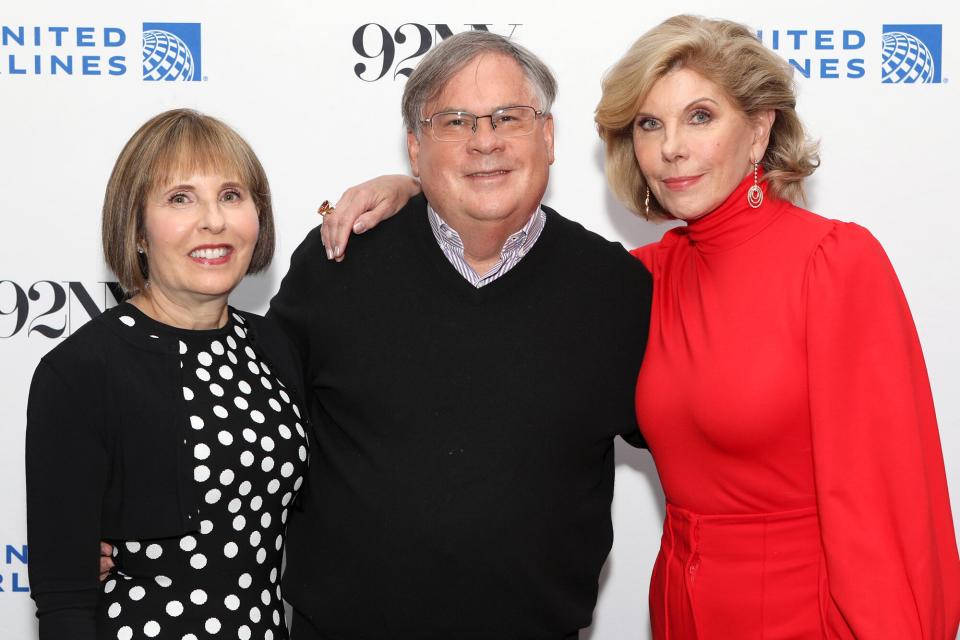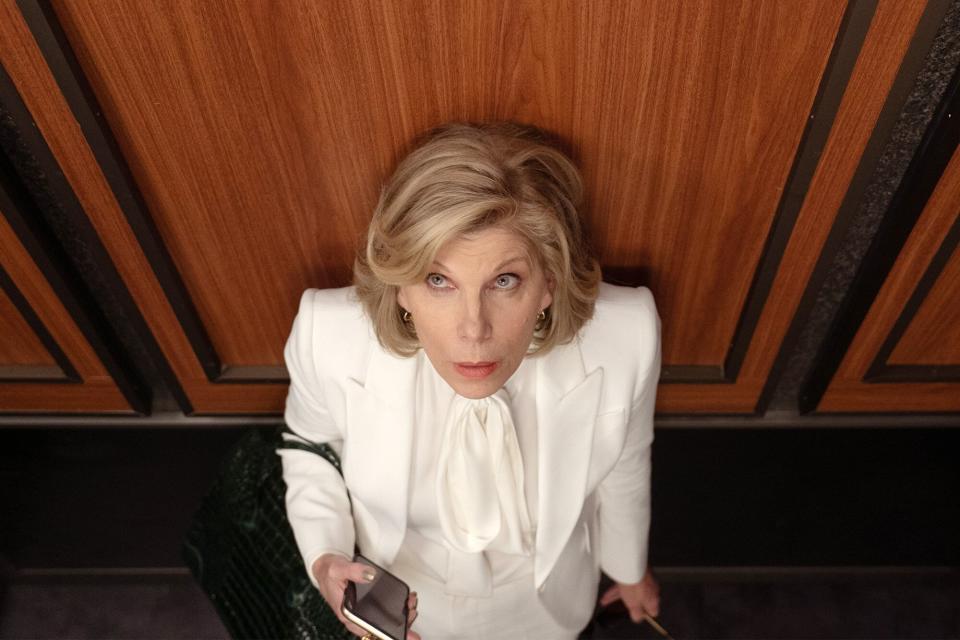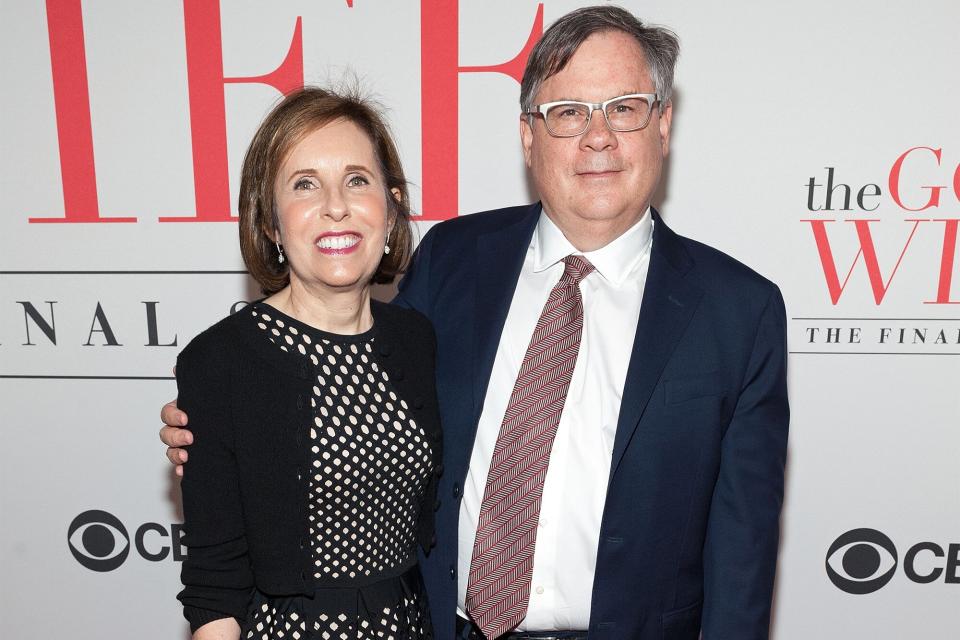Christine Baranski and The Good Fight creators on the 'primal scream aspect' of the final season

- Oops!Something went wrong.Please try again later.
- Oops!Something went wrong.Please try again later.
- Oops!Something went wrong.Please try again later.
- Oops!Something went wrong.Please try again later.
After six wild seasons, The Good Fight came to an end in November for Christine Baranski and her 13-year turn as the liberal, feminist powerhouse attorney Diane Lockhart.
The popular Paramount+ series ended just as it began — with Diane watching former President Trump on television in disbelief. A choice that creators and showrunners Robert and Michelle King say was made fairly early into the production of the final season. Deciding on Nov. 10, co-creator and co-showrunner Robert King tells EW, "We wanted the audience to think it was a date of something apocalyptic. And the only thing that really shook us throughout the process is that for a little while there, it seemed like Trump was going to announce early — the writers' room would bet that Trump would not wait until after midterms to announce. We thought it was the best way to end the show because it was the way the show started."
While the series' predecessor The Good Wife was about how the former wife of an ousted politician kind of becomes him, The Good Fight has always been about holding a very creative mirror to American politics… the good, the bad, and the extremely ugly. "[The final season] really had a primal scream aspect about these weird years of an administration out of control and what it does to the common people," King added. "Or at least common people who are upscale lawyers in Chicago. We wondered what that would do to them... and decided 'okay, we're back into it. Time to go in for the second round in a prize box ring. You can't sit on the sideline, you have to get back into the fight."

Hippolyte Petit/Getty 'The Good Fight' showrunners Michelle and Robert King with series star Christine Baranski
Baranski, and co-creators Robert and Michelle King, jumped on a call with EW to talk about the final season (which will have one final shot at awards this fall), that explosive ending, and what's (might be) next for Diane.
ENTERTAINMENT WEEKLY: We've seen Diane go through a lot, especially those of us who have been there since The Good Wife. What did you think when you heard what the Kings were thinking about the finale?
CHRISTINE BARANSKI: When it was explained to me, I understood it. Last year I was reading a book called "The Coming Civil War" by Tom Kawczynski. I told Robert and Michelle, you've got to read this book — we had talked about the show in terms of a civil war coming and how it's encroaching. Then I thought, well, the worst thing possible would be for us to start repeating tropes that we had done before. Are we going to really watch Diane be angry and frustrated yet again if Trump runs again or if he gets elected again?
The character rather curiously in the darkest of seasons became lighter in tone because she was under treatment. She was seeing flowers more brightly, experiencing a flirtation with a man who stimulated her intellectually and spiritually. The character of Diane curiously became lighter. Now that it's over and I can really step back, I think it was a really good time to end it. I think we're ending this at a very hot temperature, which I think is perfect.
One of the best new additions was Andre Braugher. He brought a whole new persona to the series. How did that affect what this final season, him showing up, would look like?
MICHELLE KING: I would say that we knew Andre Braugher would be good, we knew he would be great, but I could not have known how great he would be. He was so magnificent and just put that character on — it was inspiring to the writers.
ROBERT KING: We got three things from Andre, maybe some of it unexpected. One, we wanted comedy, which obviously he brought massive and massive amounts. The other was a bit of a mystery of how dangerous he was and how sympathetic he might or might not be. The third is a really compassionate person who made the Christianity aspect, the kind of showy Christianity aspect, work, which was surprising because that was such a stretch. I think almost any other actor could have hit one or two of those. But to hit all three, I wish we were doing a few more years because his character was amazing and he was amazing in it. One of the saddest things is we have to end before we got to see how far we could go with that character.

Elizabeth Fisher/Paramount+ Christine Baranski in 'The Good Fight' series finale
Since Audra McDonald joined, audiences have watched you both grow Diane and Liz's relationship to that beautiful friendship it is at the end. These are two women from very different backgrounds but have the same kind of goals in sight. What was it like to develop that bond with Audra? And having to say goodbye?
BARANSKI: I never say goodbye to actors because I just say, see you and we'll see each other. I will be friends with Audra for life. She is an extraordinary woman, human being, and colleague. I love how close that relationship came to ending. It was dangerous terrain. But it came down to bonding as women. We didn't know Roe v. Wade would be overturned in our final season either. I remember Carrie Preston coming on, we were setting up my close up and she said, "They've just overturned Roe." The final episode was Audra and I talking, she's saying as Liz, "You've got to go to Washington, you've got to set this up," and Diane is saying she's exhausted. Which I think was the feeling among all of us women in this country: We're exhausted. Didn't we fight this fight already? I don't know how to start again. Yet based on the friendship, Liz says, "Take a week off, just do this." And we hug and I agree to it. It's a moment between two women who know this struggle is far from over. And these two women, I mean, you could imagine the continuation of that friendship as well based on so much respect. And both of them fought a good fight in different ways.
What was the thought process on how you developed this strong friendship between Liz and Diane? Was it intentional to have the younger women, Marissa and Carmen, sort of mirror Liz and Diane's relationship?
ROBERT KING: I think this year, in our minds, was about the triumph of female friendships. So it's good that I, the one guy on the call, talk about it. [Laughs] I think we wanted some sense that Carmen (Charmaine Bingwa) and Marissa (Sarah Steele) had gone through difficulties and then kind of found some balance in their relationship. Because Marissa's dealing with issues that are very minor and Carmen's dealing with issues that are very major. Then Liz and Diane were very much dealing with the difficulties of race in the workplace. And especially a workplace that is primarily African American. Who should have a leadership role? We wanted some sense that Diane was all right with the way things were in the law firm and then found a position for herself that she was no longer reaching and grasping for the corner office at the top floor. She was okay. And that she was okay to kind of consult with Audra and suggest what she could do… That's where the friendship finds itself when these two women are working with each other and not fighting against each other.

D Dipasupil/FilmMagic 'The Good Fight' creators Michelle and Robert King
MICHELLE KING: If you want to talk further about the triumph of female friendship, it wasn't really deliberate that these two relationships should mirror one another. Because in many ways Liz and Diane are temperamentally similar — even though they are from different backgrounds, you understand that friendship. I mean, had they been in class together, they would've found each other, is the sense. As opposed to Carmen and Marissa, who are very different personalities, and yet there is that bond, that respect, that affection. So that it can work either way. Women who are similar or dissimilar can find a loving friendship with one another.
Another big reveal was the opening credits — we finally know what they're alluding to. Was that also planned early on? And you absolutely knew that you were going to have those items be focused on when the shooting happens?
ROBERT KING: Well, to be honest, no. The beginning of this season we really thought they were heading towards some apocalyptic moment and that it would be really cool if all the things we set up in the explosive main titles were the things that exploded in some way. We didn't know if it was gunshots or other things in the finale. There was a moment when we thought there was, if you remember when Hawaii got an alarm that North Korean rockets were going to land in 20 minutes? We're at this moment where people were under their desks talking for those silent 20 minutes trying to figure out what their lives were about and who they really loved and what everything mattered to them. We found it in this other form. So the simple answer is no, we didn't know that, but it seemed very appropriate to make it seem a little more lyrical, if that makes sense.
The finale also left off with many paths open to potential spin-offs, including for Diane. Is there any chance we'll be seeing Diane in D.C.?
BARANSKI: Oh, that's like discussing Mona Lisa's feet, isn't it?
ROBERT KING: Oh my God, that's such a good answer.
MICHELLE KING: We have nothing smarter to say than what Christine just said.
ROBERT KING: I would just add, I'd never say never on this.
BARANSKI: I think it's a good sign that you think about a continuation because it means the ending left you with a sense of futurity about Diane continuing the good fight and that she's going to work with a younger generation of women. But I also think she should vacation in the south of France when she's not working in D.C. How fun would it be to see Kurt and Diane in Provence with her trying to do bad things? That could be the comedy part of the show.
Is that a show pitch? Like Emily in Paris but Diane… in Paris!
BARANSKI: And we all go to the south of France to film it.
MICHELLE KING: I'm in!
Sign up for Entertainment Weekly's free daily newsletter to get breaking TV news, exclusive first looks, recaps, reviews, interviews with your favorite stars, and more.
Related content:

